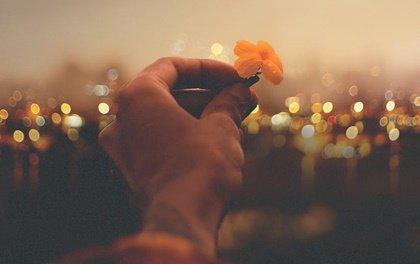“Be yourself”. That’s what you’ve always been told. Your parents, teachers, best friends, and even the world of marketing and advertising continue to emphasize the fact. You might even wear a t-shirt advertising the phrase. However, what does it really mean to be yourself?
In reality, we’ve become the kinds of people who possess no doubts when it comes to defining ourselves on social media. However, we resort to generic and hollow definitions to express who we should be, but that rarely describe who we really are. That’s often because we don’t know. Also, we tend to be dominated by external conditioning.
We want to fit in so we aspire to be part of the environment that surrounds us. We need to be liked and accepted, but this need takes away our authenticity and even our psychological well-being. Thus, in a society that’s almost always accustomed to singling out those who think, feel, and act in a unique and different way, it’s unspeakably daring to be ourselves and who we really are…
“Become such as you are, having learned what that is.”
-Pindar-
Being yourself means…
In many of the movies, series, and books aimed at children and young people, they’re urged to discover their authentic selves. The characters are heroes and heroines who break the mold, luminous figures who, due to their unique characteristics, always emerge victorious. However, when the young reader looks out into the world, they discover that they’ve been swindled. Indeed, they find that reality is extremely different.
Today’s world is a kingdom ruled by selfies and social media filters. These are resources that, from really early on, encourage young people to exhibit a false self. Teenagers learn that if they want to integrate they must imitate others. Therefore, “be yourself” becomes nothing more than an empty mandate that looks good as a phrase on Instagram, but is better not to put into practice. This is where problems arise.
When we seek to dissolve ourselves in external conventions without connecting with our own essence, we suffer. Consequently, the young people of today feel increasingly pressured, overwhelmed, anxious, and empty. They create characters and narratives which they force themselves into, like putting on a shoe that’s too tight. Later, that shoe gets so uncomfortable that anxiety, eating disorders and, self-harm arise.
Revealing our true selves is a real challenge in a world where the digital is all-important. Where happiness depends on apparent unparalleled beauty and attractiveness viewed through social media filters. It’s time to make a change, start a revolution, and start to become ourselves. Let’s see how.
In a world dominated by the digital, people have become accustomed to constructing false selves that only cause unhappiness.
Being yourself means exploring who you are and accepting yourself
Being yourself implies turning your gaze inward. However, you’re so used to looking at, admiring, and even imitating others that you’ve become a social automaton. It’s time to be a little more short-sighted and turn your gaze to what’s close to you: yourself.
Discover what defines you, and what situations, experiences, and sensations make you feel good. Turn a deaf ear to what’s expected of you and listen to your inner voice. It might have many things to tell you. Furthermore, accept each and every one of your nuances and peculiarities, because that’s where the truth lies. That’s your authentic self.
Being yourself means taking risks
When you finally dare to be yourself, you leave your fears aside, as well as those feelings of shame and insecurity. Indeed, it hurts you more to live your whole life silencing who you really are, than revealing what you feel and need. However, to do it you need courage and large doses of self-love but the effort will be more than worth it. In fact, your happiness depends on it.
Guler Boyraz and colleagues at Louisiana Tech University conducted research that claimed people who are more authentic show lower levels of stress and greater psychological well-being. Therefore, if you want to have a fuller life, dare to be yourself, at all times and in every situation.
Authenticity requires deactivating your negative internal narratives
You’re the product of your upbringing, experiences, and the culture that surrounds you. This means that you’ve integrated clearly counterproductive thought patterns and perceptions. For instance, think of the narratives related to physical appearance you’ve been educated in ( too fat, too skinny, too short, too tall…) as well as the comments about worth and skills ( you’re not worth it, don’t even think about studying that subject…).
Detect the negative perceptions in your internal dialogue and transform them. Replace them with your strengths. Get in touch with your potential, virtues, dreams, and needs, and focus your attention on these more positive areas.

Being yourself means always working on the best version of you
Your identity and inner self are a polyhedral dimension. They’re made up of many faces. Some are brighter and others are a little grayer. You’re not perfect and that imperfection also integrates and defines who you are. However, being yourself means working every day on the best version of yourself, ensuring that you always give your best.
This also implies never imposing who you are, what you want, and what you like on others. Respect is key. Authenticity means celebrating that everyone has their own vision of the world and that we can all live together.
If you strive to be better every day, take care of yourself and value yourself and those around you, your coexistence will be more fulfilling.
“People often say that this or that person has not yet found himself. But the self is not something one finds, it is something one creates.”
-Thomas Szasz-
Celebrating who you are means practicing vulnerability
One final element that you should practice more in order to be yourself is vulnerability. However, it’s complicated. After all, there are aspects of yourself that you don’t like or are afraid to reveal to others. In fact, you don’t do it because you’re scared of being criticized or, worse still, misunderstood.
To really celebrate who you are, it’s a good idea to come clean. Reveal your fears, those wounds of yesterday, your frustrated dreams, and even your chronic illnesses. If we all did it, maybe we’d discover how incredibly alike we are. Many masks, filters, and falsehoods would fall away and we’d embrace ourselves in a more authentic, simple, and meaningful way.
It’s worth a try. Indeed, although being yourself is a difficult task in a somewhat frivolous world, every effort you make will be worth it.
The post Being Yourself: What Does It Mean? appeared first on Exploring your mind.



















Comments